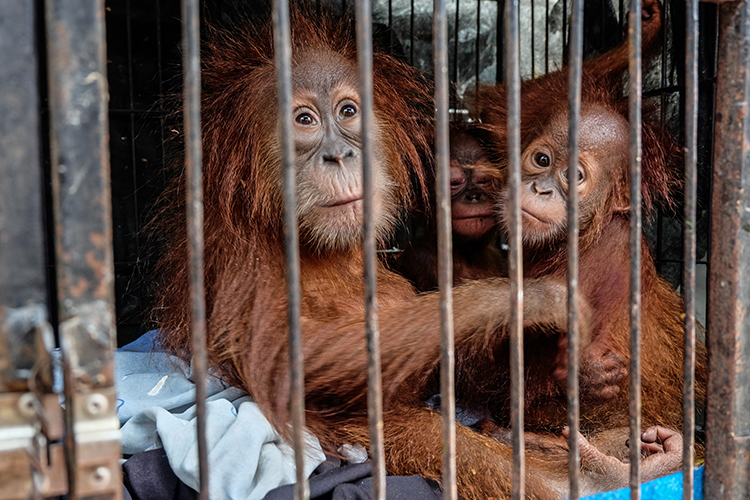United Nations must adopt wildlife crime protocol to stop illegal trafficking, ABA House urges

These orangutans were saved by Indonesian police from illegal wildlife traffickers in December 2019. (Photo by Dedy Sutisna/Anadolu Agency via Getty Images)
The House of Delegates overwhelmingly approved a measure addressing the illegal taking and trade of wildlife at the ABA Midyear Meeting in New Orleans on Monday.
Resolution 508 urges parties to the United Nations Convention against Transnational Organized Crime to adopt a “wildlife crime protocol” that would define wildlife crime and identify measures they could take to strengthen their domestic laws around this crime. The resolution, which was submitted by the International Law Section, recommends the protocol also identify measures that could improve global cooperation efforts related to wildlife crime.
“Let me say at the outset that wildlife crime is not esoteric,” said Steven Richman, an International Law Section delegate to the House of Delegates, who introduced the resolution. “It’s not the province of one special interest group.” Not only does the illegal poaching of wildlife impact the biosphere and the environment, but the money gained from these crimes supports other illegal activities, such as money laundering and human trafficking, that affect people and the rule of law, he said.
The U.S. Fish & Wildlife Service refers to wildlife trafficking, a term synonymous with wildlife crime, as “the poaching or taking of protected or managed species and the illegal trade in wildlife and their related parts and products.” According to a 2019 report from the World Bank Group, which is cited in the report accompanying Resolution 508, the illegal logging, fishing and wildlife trade has an annual global economic value of about $1 to $2 trillion, which doubles that of counterfeiting and piracy.
A 2020 United Nations Office on Drugs and Crime report, which is also highlighted, provides an example of the economic impact of wildlife crime: Individuals involved in the illegal ivory trade and illegal rhino horn trade respectively received about $400 million and $230 million in annual illicit income between 2016 and 2018.
Follow along with the ABA Journal’s coverage of the 2023 ABA Midyear Meeting here.
“These trafficking crimes overlap and cross borders, enabled by patchwork laws, inconsistent enforcement and a lack of global information-sharing and coordination,” the report says. It adds that a UNTOC wildlife crime protocol is needed to specifically address significant global harms caused by wildlife crime and the lack of an international legal framework to prevent and combat it.
Beth Whittenbury, the immediate past chair of the Section of Civil Rights and Social Justice, also spoke in support of Resolution 508 in her personal capacity. She told the House she has spent the past 10 years trying to protect the endangered Mexican vaquita porpoise, which are often caught and drowned in gillnets in the Gulf of California.
“The reason they are down to 12—12 individual vaquitas left—is because organized crime in Mexican waters is putting out gillnets to catch another endangered species, the totoaba sea bass,” Whittenbury said. “This resolution would allow us to define wildlife crime in a way that would protect the vaquita as it would protect elephants, rhinos and koala bears. It’s very important and it also would allow us to put together a coalition so that we can work internationally on this.”
The International Law Section plans to share Resolution 508 with international organizations and groups that are working to encourage UNTOC to add a protocol recognizing and addressing wildlife crime.
The measure is co-sponsored by the Criminal Justice Section, Section of Environment, Energy and Resources and Tort Trial and Insurance Practice Section.
See also:
ABA Journal: “Could international animal rights laws prevent the next pandemic? Rajesh Reddy has a plan”
Write a letter to the editor, share a story tip or update, or report an error.



